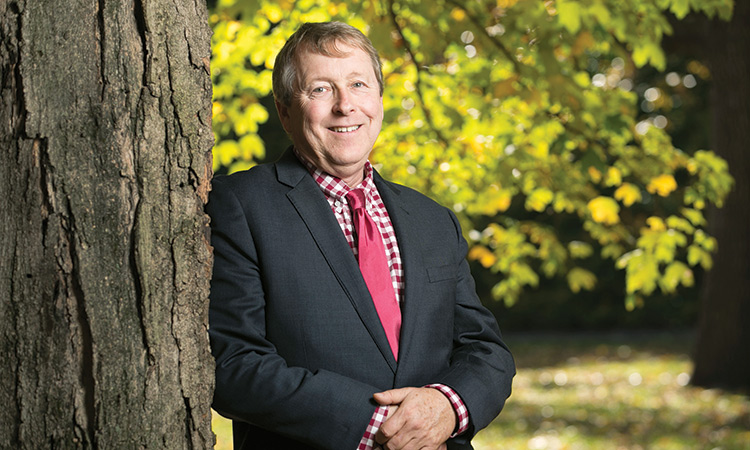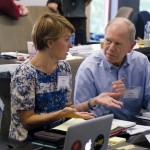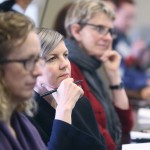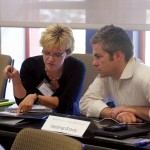
It’s time to let you in on the Owen School’s best-kept secret: The school educates hundreds of business professionals every year outside of its traditional MBA and master’s degree programs.
That far corner of Management Hall with signs that say “Executive Programs?” That’s where the secret is kept: It’s one of the locations for Vanderbilt’s Executive Development Institute, which provides short but intensive nondegree business courses, custom education programs for companies, and challenging certificate programs in key business principles. (The program also has offices across the street from campus at the Loews Vanderbilt Hotel office complex.)
Established in 1978, the institute now has its first full-time executive director, Robert “Skip” Culbertson, who joined Owen in 2014. A longtime human resources and executive education leader, Culbertson aims to grow EDI’s impact, expand the Vanderbilt Owen brand and forge new partnerships with client companies.
As he does that, there are some things he won’t change: courses taught by the same business faculty and lecturers as the degree programs; content that focuses on leadership, teamwork and core business skills; and the core of the Owen School experience—excellence, collegiality and accessibility.
“The main thing here is the intimacy you get out of the Vanderbilt experience,” Culbertson says. “We’re not a mass shop. You get to know the people in your courses—your network—and the organization very well. The faculty are accessible. The Vanderbilt experience is based on understanding, knowing and helping each other succeed.”
Classroom dynamics
Participants range from those wanting to hone skills in a particular business topic to MBAs brushing up their skills. Others want to advance within their organizations, and some want to earn Vanderbilt credentials. Participants can take any of 15 different classes, and Culbertson says more are in development. Those aiming for certificates of excellence take four courses over time. Custom programs developed with company clients can vary in content, instructors and even location based on organizational needs.
Each class is taught by Vanderbilt faculty and/or subject-matter experts from industry. These two- to three-day classes typically include 20 to 30 participants, with plenty of opportunities for sharing insights—and contact information for valuable networking.
Bill Stanczykiewicz, president and CEO of the nonprofit Indiana Youth Institute in Indianapolis, says the chance to share a classroom with others was what inspired his organization’s board to send him to Vanderbilt’s EDI program. At first, Stanczykiewicz says, he looked at another renowned school that was closer to home. “The board actually insisted I go to Vanderbilt, to get away from the work environment and learn in person,” he says.
Since fall 2011, Stanczykiewicz has logged six classes, earning a Vanderbilt certificate in leadership excellence along the way. He worked on a class project that laid the groundwork for his organization’s statewide college and career counseling initiative, learned he was more creative than he originally thought, and learned from instructors who have shaped the way he teaches his own classes as an adjunct professor at Purdue University.
“It was a remarkable experience,” he says. “I only wish there were more classes for me. Ninety percent of the subject matter transferred directly to my work.” In addition, whenever he didn’t want to burden the rest of the class with a nonprofit question, he says the instructors were readily available to provide personalized insight in private conversations.
Organizations benefit
Sue Hall, senior leadership and organizational development consultant at Tennessee Valley Authority in Knoxville, Tennessee, also has seen great growth through the EDI program. In her case, however, it has been from a different vantage point.
Through a long-term partnership with Vanderbilt, TVA has had upwards of 300 rising middle managers receive a broader view of the company as well as overall business topics. TVA’s custom EDI program has seen roughly 45 percent of its graduates experience lateral or upward movement in the organization within two years.
The program, currently on hiatus, has included subjects such as accounting, process improvement coaching and strategic decision making. It also has featured team-based action learning projects specific to TVA issues. Better yet, Hall says, participants presented those projects to senior management on graduation day, further increasing their own visibility.
Custom programs within organizations such as TVA and Nissan give employees a different type of currency than an MBA, says David Owens, professor of the practice of management and innovation. “A program like this gives people face time with executives, people they’d never see otherwise,” he notes.
Owens has taught in Vanderbilt’s MBA program for about 15 years and at EDI for about a dozen. He says each of the two programs has influenced his teaching style in the other. Early on, he says, he was more philosophical with his MBA students and more applied with those in EDI. Now he’s more balanced with each.
Jon Lehman, adjunct professor of management and EDI faculty director, says he’s learned that he enjoys all types of students. His specialties are health care, strategy and business economics.
“I know EDI is going to see expanded programming, that we will develop deeper relationships with more clients, and that we will expand our geographic reach,” Lehman says. “I think we will see a period of significant growth.”
Drawing trans-institutionally
In expanding the program, Culbertson would like to see not only more partnerships with client organizations, but also greater collaboration university-wide. He envisions instructors from Peabody College, the School of Engineering and the School of Medicine, for example, in addition to those from the business school.
The Executive Development Institute’s offerings are typically composed of about 60 percent custom and 40 percent open enrollment students. Culbertson aims to move to a 50-50 balance over time. “For that, we’re going to have to expand our open portfolio,” he says. Ideas at various stages of fruition include a focus on health care, strategic leadership and critical thinking, and private wealth management with an emphasis on family succession. Though the on-campus experience is part of EDI’s draw, the program just launched its first online learning program, a version of Owen’s Strategic Innovation course. The program drew students from 15 states within the U.S. as well as Brazil, Mexico, Canada and Africa.
“EDI is a gem. I wouldn’t have taken this job if I didn’t believe it,” Culbertson says. “There’s a lot of great positive backwind for us to sail on.”
Find more about EDI at vu.edu/owen-edi





